Sugar was a rare commodity on the frontier, but Lincoln and his sister Sarah certainly were familiar with honey. Their father would follow a bee to discover its stash of honey, and he would bring back some fresh honey combs dripping with the golden sweet treat.
Abraham and his step-brother, John, liked to go coon hunting with other boys. Apparently, though, their parents did not often approve of them going into the woods at night to hunt coons. So Abraham and John made it a practice to slip out of the house. Their plans were frequently foiled, however, because their little yellow dog, Joe, would yap and yap, giving them away.
So one night the boys took Joe with them, and the boys efforts to teach the dog a lesson inadvertently turned deadly. This is what happened:
Cat Man
Lincoln was known to like animals, but he was especially fond of cats. Mary Lincoln would later write to her husband about a kitten, referring to cats as his "hobby." As a man who loved cats, Lincoln was apt to bring stray kittens home.
When Lincoln was a boy, about the time that Sarah Bush Johnston came to the Lincoln cabin to be his new mother, he had a pet cat. Some say that the cat came with the widow Johnston, since the Lincolns did not bring any pets with them when they came from Indiana. But other historians are not sure that this is the case. At that same time, Lincoln frequented the store owned by James Gentry in Gentryville--a place where people came and went. Lincoln could easily have met someone with a kitten there.
What is clear, though, is that Lincoln had a pet cat that followed him on his trips down to the spring to fetch water.
Fido the Family Dog
Fido was the family dog when Lincoln and his wife Mary lived in Springfield. He was a medium-sized, tawney yellow dog of an unknown mix. His fur was short and rough, his ears long, and his tail short.
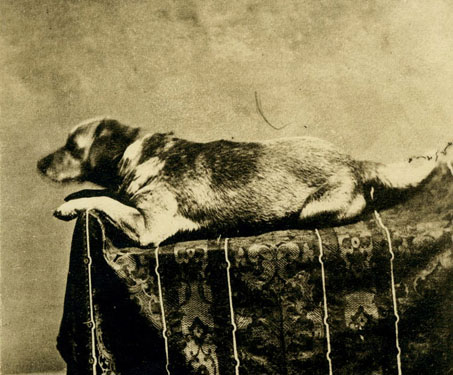
The Lincolns had to leave him in Springfield when they moved to the White House. Fido moved to the home of John Roll, who had boys about the same age as Willie and Tad. A Springfield barber named Billy (William Florville) later wrote to Lincoln, saying, "Tell Taddy that his (and Willys) Dog is a live and Kicking doing well."
This CDV of Fido is listed as a lot in Cowan's Auctions American History auction catalog for December 7, 2012. It is estimated at $1000-$1500. The front shows an image of Fido facing the camera. The back is stamped, "F.W. Ingmire, Springfield."
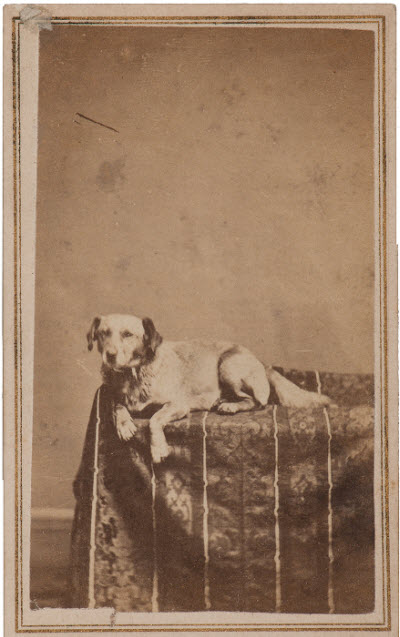
Little Jip
Because the Lincolns came to the White House without any animals, they replaced Fido with a little dog named Jip. A friend of Lincoln's wrote about the dog to his son, calling Jip "a very cunning little fellow." He described Jip as a "very beautiful little dog" who "barks & stands up straight on his hind feet & holds his fore feet up."
Lincoln and His Horses
Lincoln owned several horses--though not all at once--including Tom, Belle, Old Buck, and a reddish-brown horse named Robin (who was called "Old Bob"). Lincoln rode Old Bob when on the circuit as a lawyer.
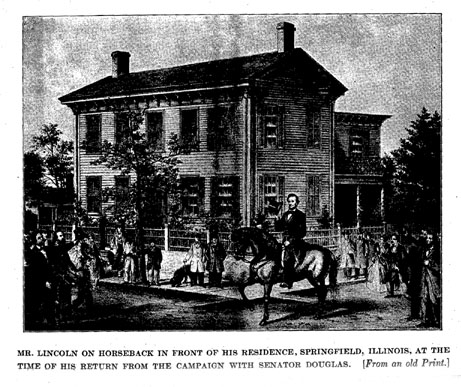
Lincoln left Old Bob in Springfield when he went to Washington, D.C. There, Lincoln got a new horse, whom someone named "Old Abe." When Abraham Lincoln went to the Soldier's Home just outside of Washington, it was on Old Abe that he rode. Lincoln told this story to Marshal Lamon about an assassination attempt while on his way to the Soldier's Home:
"I was jogging along at a slow gait, immersed in deep thought, when suddenly I was aroused--I may say the arousement lifted me out of my saddle as well as out of my wits--by the report of a rifle. [He heard a bullet whistle past his ear.] Old Abe, with one reckless bound, unceremoniously separated me from my eight-dollar plug-hat, with which I parted company without any assent, expressed or implied, upon my part. At a break-neck speed we soon arrived in a haven of safety.
"I can truthfully say that one of the Abes was frightened on this occasion, but modesty forbids my mentioning which of us is entitled to that distinguished honor."
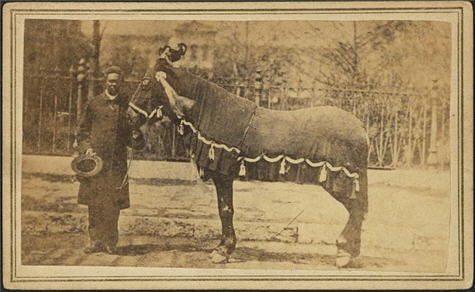
Lincoln's horse "Old Bob," on the day of his funeral in 1865, held by Rev. H. Brown
image from Library of Congress (full front of photo and crop of backside)
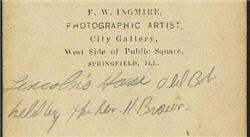
Willie and Tad and Their Ponies
Willie had a pony at the White House, and insisted on riding it every day. Tad also rode the pony; he was so small when he learned to ride it that his feet stuck straight out from the saddle. On Tad's tenth birthday, April 4, 1863 (after Willie had died), a new pony arrived at the White House. The Lincolns still had Willie's pony, but this new pony became Tad's.
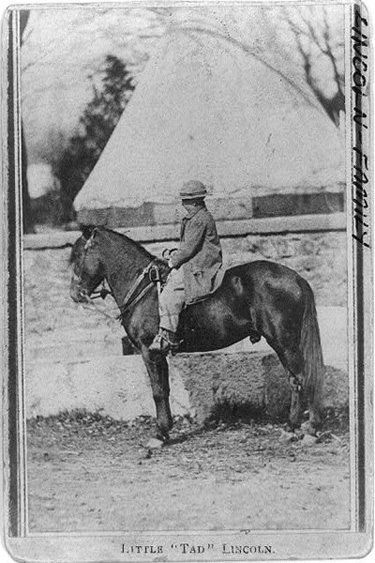
"Little 'Tad' Lincoln," photo taken between 1860 and 1865
image from Library of Congress
Tad and His Goats
Among the gifts that the Lincoln boys received at the White House were two goats: Nanko and Nannie. David Herbert Donald, in his book, Lincoln At Home , tells us:
, tells us:
Like the public at large, they [the goats] had the run of the White House. On one occasion Tad harnessed Nanko up to a chair, which served as a sled, and drove triumphantly through the East Room, where a reception was in progress. As dignified matrons held up their hoop skirts, Nanko pulled the yelling boy around the room and out through the door again.
Lincoln and Other Animals
Lincoln Rescues a Dog
Herndon's Lincoln quoted the following story about Abraham Lincoln:
Mr. Lincoln once described this journey to me. He said the grounds had not yet yielded up the frosts of winter; that during the day the roads would thaw out on the surface and at night freeze over again, thus making traveling, especially with oxen, painfully slow and tiresome. There were, of course, no bridges, and the party were constantly driven to ford the streams, unless by a circuitous route they could avoid them. In the early part of the day the latter were also frozen slightly, and the oxen would break through a square yard of thin ice every step.
Among other things which the party brought with them was a pet dog, which trotted along after the wagon. One day the little fellow fell behind and failed to catch up after they crossed the stream. Missing him they looked back, and there on the opposite bank he stood, whining and jumping in great distress. The water was running over the broken edges of the ice, and the poor animal was afraid to cross. It would not pay to turn the oxen and wagon back to ford the stream again in order to recover a dog, so the majority in their anxiety to move forward, decided to go on without him.
"But I could not endure the idea of abandoning even a dog," relates Lincoln. "Pulling off shoes and socks I waded across the stream and triumphantly returned with the shivering animal under my arm. His frantic leaps of joy and other evidences of a dog's gratitude amply repaid me for all the exposure I had undergone."
A Pig Story
When Lincoln and other lawyers were riding on the circuit, their horses rode by a pig stuck in the mud. The pig was hopelessly stuck. The more he struggled to escape his doom, the more he sank into the mire.
Lincoln noticed the pig, as did the others. Really, no one could help but noticing. But the lawyers, including Lincoln, were wearing their good clothes. Lincoln was wearing a new suit he hadn't owned for very long. So they all passed by as the pig continued to grunt and squeal.
But Lincoln could not get that poor pig out of his head. One mile passed; the pig was still there. Two miles passed; Lincoln couldn't stand it anymore. He doubled back, set on rescuing the pig.
When he arrived at the spot, he tied up his horse and started to work some old rails into the mud. Using the rails to support himself as well as to wedge under the pig, the frantic pig was finally freed.
Lincoln washed off at a nearby brook the best he could, but his suit was quite a mess. Likely ruined. Still, Lincoln was glad he did it. As he rode back to catch up with his companions, he reflected on his motive. At first he thought he'd rescued the pig just because he was a nice guy. With a little more reflection, however, he decided he'd done it out of pure selfishness. As he later told a friend, he'd gone back to free the pig to "take a pain out of his own mind."
Lincoln Speaks Out Against Cruelty to Animals
While in Crawford's school, Abraham Lincoln took it upon himself to compose an essay against cruelty to animals. This was not required work, but something Lincoln chose to do. He was very annoyed and pained by the actions of the school boys, who frequently caught terrapins and put hot coals on their backs. As Nat Grigsby put it, "He would chide us, tell us it was wrong, and would write against it."
One day, his step-brother, John, caught a terrapin and brought it to the place where Lincoln was "preaching." His step-sister, Maltilda Johnston, said that John threw the terrapin against a nearby tree, crushing its shell. The animal quivered and suffered greatly. Lincoln then preached against cruelty to animals, contending that "an ant's life was as sweet to it as ours to us."
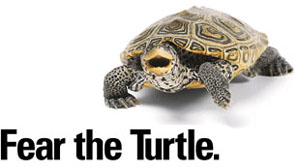
The Diamondback Terrapin is the University of Maryland's mascot.
sources:
Donald, David Herbert. Lincoln At Home, New York: Simon & Schuster, 1999.
McClure, J.B. Lincoln's Stories, Chicago: Rhodes & McClure, 1880.
Randall, Ruth Painter. Lincoln's Animal Friends , Boston: Little, Brown and Company, 1958.
, Boston: Little, Brown and Company, 1958.
Whipple, Wayne. The Story-Life of Lincoln, Philadelphia: The John C. Winston Co., 1908.







